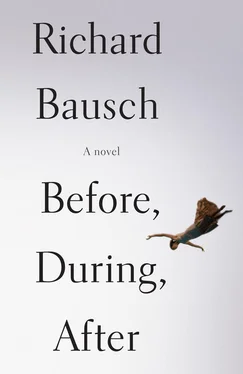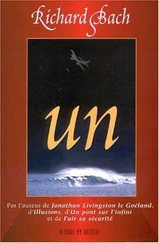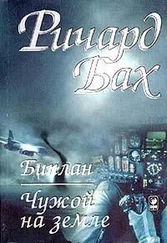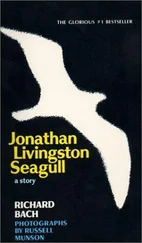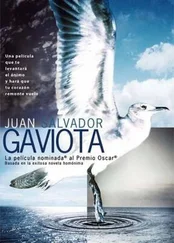“I thought I was going to need more surgery,” Iris said. “At my age.” She turned to Faulk. “You picked a very nice little place. Are you sure it’s enough for you?”
“Oh, yes. I like it a lot.” He addressed Natasha. “You sure about it, darling?”
“I adore it,” Natasha said, smiling but not looking at him.
Back at Iris’s house, the old woman put the lights on and then lit candles, too, insisting on making coffee. They sat in the kitchen and breathed the aroma of the coffee and of the candles, and they talked to her, also by her insistence, about the last four days — their separate journeys home. In the paper there was a report that the plane that went down in Pennsylvania might have been shot down. Several witnesses reported two fighter jets flying near it. The deputy secretary of defense was denying that any planes had been in the vicinity. And the first intimations were surfacing that the passengers of the hijacked airliner had caused the crash. Faulk read this aloud from the paper while they sipped the coffee. And then he told Iris about his Palestinian cabdriver. “I couldn’t really say anything, and I guess I felt the smallest bit chary of him — the way I bet a lot of people will feel for a while about everybody from that part of the world.”
Iris said, “They should have a government-required course in all the schools on earth where people are asked to meet people from distant places and get to know them as individual people.”
“In the best of worlds,” Faulk said. “But these killers knew people personally. It didn’t matter to them. They lived here. God. They made friends and went to parties.”
“What is the name of the one they say did this? I’ve been hearing about him for years. But I can’t keep it in my mind. The names are so scary sounding, anyway, don’t you think?”
Faulk said the name. She sipped her coffee and pondered it. “I never dreamed I’d ever see anything like this. It’s like science fiction.”
Natasha looked at them both, her grandmother and her husband-to-be. They were going on about it — the subject, she knew, of most conversations now. She rose and excused herself, claiming tiredness, and wanting to get cleaned up. She took the bag with her toiletries in it and went up the dark stairs to her bedroom. When Iris and she had made the move into this house, Iris had tried to make the bedroom exactly like the one in the old house, painting it the same off-white and hanging all the same pictures on the wall: a framed photo of her parents standing in rainy light on a street in London; drawings and early watercolors that she had done of Iris and of people she knew and singers — Phil Collins, Sting, Bob Dylan, and Joni Mitchell. Folded in the dresser to the left of the door were clothes she had worn back then or clothes she had left here on visits through the years. She opened the top drawer of the dresser and looked at the tight folds of cloth. It felt like being given a vision of the earlier life. Finally, she closed it and in the thrown light from the hall, put the case on the chair by her bed and opened it. She could hear their voices below, but no words — Faulk laughing briefly at something. Stepping to the window, she looked out at the street, the lights in the houses that lined the other side. There was so much suffering in the country now, so much grief. And fear. She took a deep breath and resolved to stop letting her own predicament block her vision of the general calamity.
She felt like crying again and caught herself. She went into the bathroom and put some fresh makeup on.
Downstairs, Faulk heard her cross the hall into the bathroom, heard the door close quietly. He had been reading another part of the paper to Iris, who sighed now and told him she liked how the president, a man she never thought much of, handled the speech at the site of the destruction. “They’re calling it ground zero,” she said.
“I know.” Faulk glanced at the stairs.
“She was pretty sure you were hurt or killed,” Iris murmured. “I know how her mind works. She has a catastrophic imagination in the best circumstances. She’s always been that way.”
“Yes.”
“She thought for sure you were in one of the towers. Or on the street below. I must say that crossed my mind, too.”
“I talked about going down there and going up in one of them for breakfast. The wedding was supposed to be in that neighborhood, by the way. I don’t know if she mentioned that to you. That church is where they took some of the injured.”
“God, it just hasn’t really sunk in yet, for her, that we’re all okay.”
“I think there’s something else bothering her, though.”
The old woman waited.
“I’d like to talk to her friend Constance.”
“What could it be other than this? She was certain she’d lost you.”
“Maybe I’m just reading into things.”
“But what . What would — what could you be reading into it?”
“I don’t know. Maybe something’s changed for her.”
“I don’t think we know how to be anymore,” Iris said. “That’s the thing. It’s all completely unthinkable and awful.”
“In New York,” Faulk said, “on Fifty-Fourth Street, unless you were looking south, you would not have known anything was wrong — except for the sirens. I didn’t know about it until Clara called me.”
“I was listening to Morning Edition .” Iris stood and opened the refrigerator. “I’ve got a roast ready to go. I put it in earlier today.”
“Can I help?”
She smiled. “You can mash the potatoes.”
Natasha, coming down the stairs, heard this and felt a twinge of nausea at the idea of the three of them sitting at that table with dinner before them. Dinner. A task requiring energy she did not have. She took a breath and strode into the room and leaned down to kiss Faulk on his cheek. His hand came gently to the middle of her lower back.
“What can I do?” she asked.
Faulk saw the bones of her jaw. “You’ve lost a little weight,” he said, casually, wanting to be talking about anything else, realizing almost immediately that this was the wrong thing to say.
She removed herself from him and went to the other side of the table. “I don’t think so.”
Iris stared. “You do look a little drawn, honey.”
“I’m fine,” Natasha said, and sat down.
There were red blotches on her cheeks. “I didn’t mean to embarrass you,” Faulk said.
She waved this away, aware of him looking into her. She presented him with a smile, then rose to go stand next to Iris, who was preparing to slice the pot roast.
“Tell us,” Iris said. “What people did, stuck like that? I mean the ones who weren’t affected — Europeans and such.”
“It seemed to me that everybody got drunk and stayed that way.”
“And you?” Faulk said.
“The first night, I did. And as a matter of fact I’d like something to drink right now.”
“I have some wine,” said Iris, opening the cabinet and bringing out a bottle of Bordeaux. Faulk uncorked it, and Iris put three glasses down on the counter. For a moment the only sound was the wine pouring.
“Love that sound,” Faulk said. Then he held up his glass. “Nice dark color.” He drank and smiled at them and set the glass down. “Delicious.”
“Very good,” said Iris.
“I like that word for describing it,” Natasha said to Faulk. “Delicious.”
He stood and reached for the bowl of potatoes. Iris had set a milk carton out. He poured a little milk over the steaming potatoes and then put a big dollop of butter on them and began mashing them. Natasha and Iris went on sipping the wine.
“ Delicious is the word,” Iris said.
Читать дальше
